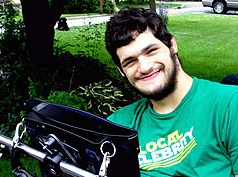
The American Spectator
“With the calloused end of a single finger, Miles Forma is putting the vast majority of the rest of us to shame.
Wheelchair-bound, robbed of his speech and most other movement by cerebral palsy, the 17-year-old Forma could be understandably focused — fixated, even — on the trials and tribulations in his own life. Instead, this disabled teenager has opted to take on a more global perspective and some of the world’s problems to boot.
To wit: After seeing Hotel Rwanda on his winter break earlier this year, Forma didn’t simply “tsk-tsk” about the tragedy of it all. “It made me sad and angry that no one was helping the people of Rwanda, so I decided to do something about it,” Forma explained via a computerized voice emulator called Dynavox, the same technology that allowed him to chant Hebrew passages at his bar mitzvah a couple years back. Though these amplified words had the unmistakably inhuman texture of any modern corporate call center, they were nevertheless laden with sincere emotion.
Once back at Crotched Mountain, a specialized school in New Hampshire for the disabled, Forma gave a presentation on the atrocities, set up a screening of the film, and collected thousands of dollars for the American Jewish Joint Distribution Committee to help reintegrate Kibungo Prefecture youth from war-devastated families back into Rwandan society.
As a measure of his success, Forma was received as a minor star during a recent appearance of Paul Rusesabagina, the real-life hero who inspired Hotel Rwanda, in Bedford, New Hampshire. The contrast between Forma and the local dignitaries and politicians at the event was impossible to ignore — inspiring and sickening all at once.
There, on one hand, were men and women in positions of power on the federal, state and local level, and the best they could come up with for an event commemorating a genocide — in front of a man who risked his own life to save others, no less — was to serve up some boilerplate diversity talk with a side of vague platitudes that anyone possessing even a cursory understanding of political-speak understood were as empty as an atom vortex floating in front of a black hole. In short, it was a bipartisan display of self-absorption.
Yet, in a room filled with so many words stifling any hope of substance, Forma, despite all obstacles, stood out as a man of action and probably the closest in spirit and sentiment to Rusesabagina in attendance that evening. While the politicians made their bland little self-congratulatory speeches, Forma’s father wheeled him into the convention center hallway over and over again to speak with reporters. With great effort Forma pounded out answers to questions about his fundraising on behalf of Rwandan refugees as well as his plan to expand his efforts to help Sudanese refugees on his keyboard.
“Before I saw the movie, I really had no idea of what happened in Rwanda,” Forma explained. “It made me think of the Holocaust during World War II and what happened to the Jews. I still do not understand why the world did not try to stop what was going on in Rwanda.”
“There probably aren’t a lot of people who saw that movie twice,” Forma’s father Tony added. “But Miles insisted. He just couldn’t believe his eyes the first time. Then he became determined to do something about it.”
Perhaps we cannot answer every bit of violence and horror the world throws our way. Then again, it is exceedingly clear that neither can the societal or governmental structural bulwarks we are encouraged to depend completely upon. This is not to say there isn’t any worth in collective efforts. To the contrary, this young man raised money for an agency that will now deliver it to Rwanda, whereas he could almost certainly not have done so himself. We live in a world of middlemen, as even the most reluctant among us must accept.
Still, the example Forma set by taking the initiative to create positive change out of thin air is worth indescribably more than any number of speeches by politicians who are constantly reacting, constantly spinning. The core message here is empowered people are active people and even those in the most difficult circumstances can empower themselves if they care enough to try.
If Jerry Springer can have a final thought daily on midget prostitutes and kissing cousins, allow me to present one that far too many of the mainstream media outlets seem uninterested in exploring: If Miles Forma can do all this on his own, what excuse do the rest of us have?
–Shawn Macomber, September 2005.
